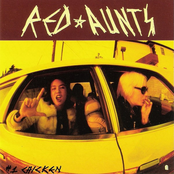#1 Chicken

Biography
Female punk rockers the Red Aunts were a rough, raw, raunchy combo that arose during the California punk revival of the '90s. Both praised and dismissed for their garage-band amateurishness early on, the band crafted a grimy, scuzzy sound inflected with subtle strains of blues, country, and pre-Beatles rock & roll. That sound matched well with their lyrics -- the Red Aunts weren't really political or explicitly feminist; they just wanted to rock out, and many of their songs had a trashy sense of...
Female punk rockers the Red Aunts were a rough, raw, raunchy combo that arose during the California punk revival of the '90s. Both praised and dismissed for their garage-band amateurishness early on, the band crafted a grimy, scuzzy sound inflected with subtle strains of blues, country, and pre-Beatles rock & roll. That sound matched well with their lyrics -- the Red Aunts weren't really political or explicitly feminist; they just wanted to rock out, and many of their songs had a trashy sense of humor descended from avowed influences the Lunachicks. At least musically, they also earned numerous comparisons to the abrasive, grungy skronk of Babes in Toyland, though they didn't have quite the same sense of cathartic urgency. The more the Red Aunts recorded and toured, the better their musicianship got, and they were able to move from the short, enthusiastic blasts of their early records to more intricate and demanding songwriting.
The Red Aunts were formed in Long Beach, CA, in 1991 by guitarist/vocalist Terri Wahl (aka Angel, aka Louise Lee Outlaw), the wife of Claw Hammer leader Jon Wahl. She recruited two of her friends, lead vocalist/guitarist Kerry Davis (aka Sapphire, aka Taffy Davis) and bassist Debi Martini (aka E.Z. Wider, aka Connie Champagne, aka Debbi Dip) -- who, like her, had never before been in a band or received formal musical training. Learning to play was a collective process, but it didn't take too long for the band to become comfortable enough to issue two 7" indie singles, with Jon Wahl in tow as a drummer of convenience (under the alias Joan Whale). He was subsequently replaced full-time by Lesley Noelle (aka Leslie Ishino, aka Ishino Destroyer, aka Cougar).
Armed with a plethora of ever-shifting noms de punk, the Red Aunts landed a deal with the garage punk indie Sympathy for the Record Industry, and issued their debut album, Drag, in 1993. Running through 15 songs in around half an hour -- including representative numbers like "Sleeping on the Wet Spot," "Built for a Barstool," and "Lethal Lolita" -- the album's brevity and ear-shredding explosiveness mapped out the blueprint for the Aunts' early sound. The 1994 follow-up, Bad Motherfucken 40 O-Z, followed that blueprint to a tee, and was produced by Bad Religion's Brett Gurewitz, who subsequently signed the band to his Epitaph imprint.
The Red Aunts debuted for Epitaph with 1995's #1 Chicken, whose back cover bragged "14 songs in 23 minutes." It broke them to a wider audience in the punk underground, and contained one of their signature tunes in "Freakathon." The 1996 follow-up, Saltbox, found the band beginning to stretch their compositions out by adding more sections and a stronger roots-punk flavor, in the process toning down some of their raw energy. 1998's Ghetto Blaster was produced by the Dirtbombs' Mick Collins, and the band decided that it would be their swan song. Following a farewell supporting tour that summer, they moved on to other things. Martini moved to New York; Wahl devoted more time to her successful catering business, and also teamed up with Mick Collins in a new band called the Screws, which released a debut album in 1999; Davis and Noelle also played together afterward, and Davis played drums on the second Screws album in 2001. Read more on Last.fm. User-contributed text is available under the Creative Commons By-SA License; additional terms may apply.
